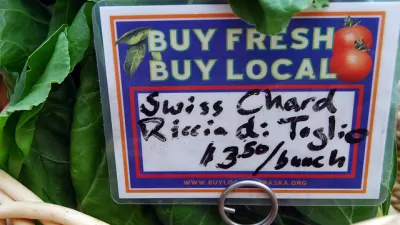The food movement has succeeded in identifying and raising awareness about the vast environmental and public health risks inherent in the world's food systems. Still waiting for a clear path to sustainability, however, is what to do about it.

Tamar Haspal, food columnist for The Washington Post, argues a point that might be difficult for some food reform advocates to hear: "The food movement has a problem: It’s right about what’s wrong with our system, but wrong about how to fix it."
After defining the "food movement" as a "loose coalition of sustainability-minded people calling for the food system to be more focused on environmental and human health," Haspal makes the case that buying fresh and local won’t save us. The reasons for Haspal's skepticism about the reach of small, local, organic farms are four, with more detail included in the article:
- They don’t grow the right stuff.
- They can’t grow the right stuff.
- The land is in the wrong place.
- Seasons.
Haspal's column concludes with a call to action to the food movement to change its focus toward solutions in the food system that can make a much bigger difference.
FULL STORY: Why small, local, organic farms aren’t the key to fixing our food system

Maui's Vacation Rental Debate Turns Ugly
Verbal attacks, misinformation campaigns and fistfights plague a high-stakes debate to convert thousands of vacation rentals into long-term housing.

Planetizen Federal Action Tracker
A weekly monitor of how Trump’s orders and actions are impacting planners and planning in America.

In Urban Planning, AI Prompting Could be the New Design Thinking
Creativity has long been key to great urban design. What if we see AI as our new creative partner?

King County Supportive Housing Program Offers Hope for Unhoused Residents
The county is taking a ‘Housing First’ approach that prioritizes getting people into housing, then offering wraparound supportive services.

Researchers Use AI to Get Clearer Picture of US Housing
Analysts are using artificial intelligence to supercharge their research by allowing them to comb through data faster. Though these AI tools can be error prone, they save time and housing researchers are optimistic about the future.

Making Shared Micromobility More Inclusive
Cities and shared mobility system operators can do more to include people with disabilities in planning and operations, per a new report.
Urban Design for Planners 1: Software Tools
This six-course series explores essential urban design concepts using open source software and equips planners with the tools they need to participate fully in the urban design process.
Planning for Universal Design
Learn the tools for implementing Universal Design in planning regulations.
planning NEXT
Appalachian Highlands Housing Partners
Gallatin County Department of Planning & Community Development
Mpact (founded as Rail~Volution)
City of Camden Redevelopment Agency
City of Astoria
City of Portland
City of Laramie




























